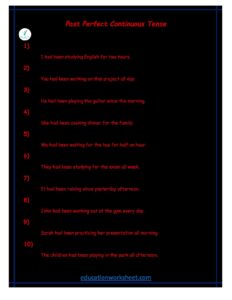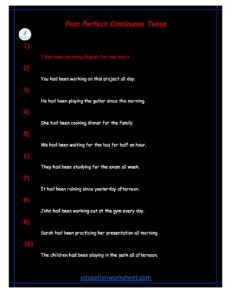how to converting Past Perfect Continuous Tense interrogative sentences to positive form 20 worksheets
Description of Converting Past Perfect Continuous Tense Interrogative Sentences to Positive Form
Introduction
In the realm of English grammar, tenses play a crucial role in conveying the timing and duration of actions. The how to converting Past Perfect Continuous Tense interrogative sentences to positive form is one such tense that is used to describe actions that were ongoing or in progress in the past, up to a certain point. Understanding how to convert interrogative sentences in this tense to positive form is an essential skill for effective communication. This guide will take you through the process, step by step.
Past Perfect Continuous Tense
The how to converting Past Perfect Continuous Tense interrogative sentences to positive form , also known as the Past Perfect Progressive tense, is used to express actions that began in the past and continued up to a specific point in the past. It is formed by combining the past perfect auxiliary “had” with the present participle form of the main verb, along with the auxiliary “been.”
Example of how to converting Past Perfect Continuous Tense interrogative sentences to positive form :
- Interrogative: Had he been studying for two hours?
- Positive: He had been studying for two hours.
how to converting Past Perfect Continuous Tense interrogative sentences to positive form

Guide to how to converting Past Perfect Continuous Tense interrogative sentences to positive form Converting Interrogative to Positive Sentences
Identify the how to converting Past Perfect Continuous Tense interrogative sentences form positive
To begin the conversion process, you must first identify the interrogative sentence in the Past Perfect Continuous tense that you wish to transform. Interrogative sentences typically start with an auxiliary verb, such as “had,” and are used to ask questions.
Example:
- Interrogative: Had they been working on the project all day?
Remove the Question Structure
The first step in converting an interrogative sentence to a positive form is to remove the question structure. This involves eliminating the auxiliary verb at the beginning of the sentence and adjusting the word order.
Example:
- Interrogative: Had they been working on the project all day?
- Remove the question structure: They had been working on the project all day.
Maintain the Verb Tense
It’s crucial to maintain the verb tense while converting an interrogative sentence to a positive one. In this case, the how to converting Past Perfect Continuous Tense interrogative sentences to positive form should still be preserved.
Example:
- Original interrogative: Had they been working on the project all day?
- Converted positive: They had been working on the project all day.
Maintain the Subject
Ensure that the subject of the sentence remains the same as in the original interrogative sentence.
Example:
- Original interrogative: Had they been working on the project all day?
- Converted positive: They had been working on the project all day.
Retain the Complement
If there is a complement in the original interrogative sentence, such as a time frame or additional information, it should also be retained in the positive form.
Example:
- Original interrogative: Had they been working on the project all day?
- Converted positive: They had been working on the project all day.
Examples of past perfect continuous tense
Maintain the Contracted Form
In spoken English, contractions are commonly used. When converting interrogative sentences to positive form, it’s important to maintain these contractions if they were present in the original sentence.
Example:
- Original interrogative with contraction: Hadn’t he been waiting for hours?
- Converted positive with contraction: He hadn’t been waiting for hours.
Be Mindful of Pronouns
When converting interrogative sentences to positive form, ensure that the pronouns remain consistent. If the interrogative sentence used a specific pronoun, the positive sentence should also use the same pronoun.
Example:
- Original interrogative: Had she been singing all evening?
- Converted positive: She had been singing all evening.
-
Example Conversions
To illustrate the conversion process further, let’s look at a few more examples:
Interrogative Sentence 1:
- Original: Had they been playing football?
- Positive: They had been playing football.
Interrogative Sentence 2:
- Original: Had you been working on the project?
- Positive: You had been working on the project.
Interrogative Sentence 3:
- Original: Had he been cooking dinner?
- Positive: He had been cooking dinner.
Interrogative Sentence 4:
- Original: Had we been watching a movie?
- Positive: We had been watching a movie.
Common Pitfalls
While converting interrogative sentences to positive form, it’s essential to avoid some common pitfalls. Here are a few things to keep in mind:
1. Don’t change the main verb or “been.”
The main verb and “been” should remain the same in both the interrogative and positive forms of the Past Perfect Continuous Tense. Changing them could alter the tense’s meaning.
how to converting Past Perfect Continuous Tense interrogative sentences to positive form

-
2. Maintain subject-verb agreement.
Ensure that the subject and the verb agree in number. For example, if the subject is plural in the interrogative sentence, it should remain plural in the positive form.
3. Be aware of the sentence structure.
Pay attention to the word order. In interrogative sentences, the word order is often inverted, and this needs to be corrected when converting to positive form.
Practice Exercises
To strengthen your understanding of converting Past Perfect Continuous Tense interrogative sentences to positive sentences, try these practice exercises:
Exercise 1:

how to converting Past Perfect Continuous Tense interrogative sentences to positive form -
Convert the following interrogative sentences into positive sentences:
- a) Had they been singing at the concert?
- b) Had she been practicing the piano?
- c) Had you been studying Spanish?
Explain how to converting Past Perfect Continuous Tense interrogative sentences to form positive
Learn the step-by-step process of converting Past Perfect Continuous Tense interrogative sentences into positive form with our comprehensive guide. Master English grammar and language skills effortlessly

